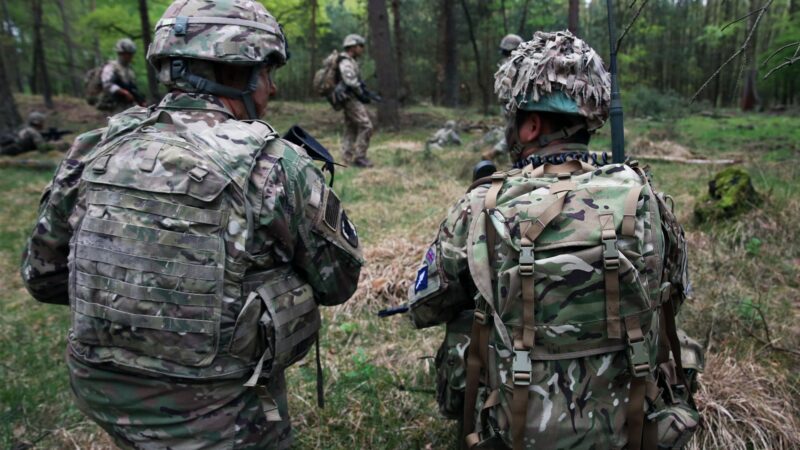Keir Starmer has called for a vote in the Commons on Boris Johnson's plan for a slight reduction in army personnel numbers. Why?

Symon Hill is Campaigns Manager of the Peace Pledge Union, and a history tutor for the Workers’ Educational Association.
Despite headlines about cuts to troop numbers, recent policy announcements by Johnson’s government represent an onslaught of militaristic policies. Yet the Labour leader has chosen to focus on the former.
On Monday, the Defence Command Paper set out plans including a new submarine project, investment in new Tempest combat aircraft and a new special forces unit called the Special Operations Brigade.
This follows Johnson’s announcement last week of an increase of 44% in the limit on nuclear warheads owned by the UK government.
This is all made possible because in November, Johnson promised to raise UK military spending by £24bn over four years – the biggest percentage increase since the Korean War.
And if we try to protest about this, the new Police Bill could be used to heavily restrict our freedom to do so.
There can be little doubt that this is the most militaristic government for more than 30 years. I could be driven almost to despair by the sight of the Leader of the Opposition ignoring this reality and instead focusing on the one detail of the government’s new policies that appears not to fit the pattern – and attacking the government for not being militaristic enough!
Full-time army personnel numbers are being cut in practice by about 4,000. The cut is partly about the army’s failure to meet recruitment targets for years, despite their increasingly desperate recruitment campaigns. Understandably, many young people are not keen to join an organisation requiring obedience to authority and willingness to kill when told to.
Rather than listening to the voices of these young people, Keir Starmer seems keen to ally with right-wing Tory backbenchers who object to troop cuts – many of whom have been in jubilant mood about the massive increase in military spending and the plans to increase the UK’s military presence around the world.
Why are so many leading Labour politicians so terrified of standing up to the militarist lobby? The British public are not all flag-toting ultra-nationalists, contrary to the stereotypes that some middle class liberals seem to believe. The opposition could be making powerful arguments against militarism.
They could be pointing out that by raising military spending, the UK government will give Putin’s vile government in Russia a perfect excuse to do the same. That by increasing nuclear warheads they give other governments a similar excuse and run a serious risk of fuelling an arms race that will make the whole world less safe. That throwing billions into submarines, planes and special forces will divert money from where it is really needed – at a time when ministers claim that they cannot “afford” a pay rise of more than 1% for nurses in England.
Most importantly, they could point out that the last year has exposed the lies of militarism. Covid is a deadly reminder that weapons cannot make us safe. “Defence” must involve protection from the threats we all face to our security, including pandemics, poverty and climate chaos.
The only thing that will be protecting by these new militarist policies is the profits of arms dealers. RAF boss Mike Wigston, in his article promoting the changes, made no secret of the extent to which they were driven by arms companies. “The RAF has a unique relationship with our world-class aerospace and tech industries,” he wrote. “I want to take that to a new level”.
Not only is Starmer proposing to ally himself with some of the most right-wing and militaristic Tory MPs on troop numbers. Shadow Foreign Secretary Lisa Nandy has refused to say that Labour would even vote against increasing the cap on nuclear warheads rather than abstain.
Thankfully, this excessively cautious Labour leadership can at times be moved by grassroots pressure. Having intended to abstain on the Police Bill, they voted against it after realising the level of popular opposition. Having abstained on the second reading of the Overseas Operations Bill (which will make it almost impossible to prosecute UK forces personnel for war crimes), they voted against it at the third reading.
Since the nuclear announcement last week, many people have been declaring their willingness to engage in nonviolent direct action and civil disobedience. There are people within and outside the Labour Party who will be campaigning against nukes and militarism on the streets, in Parliament, in the devolved parliaments, in education and at military bases too.
The Labour leadership will see anti-militarist campaigns growing. Hopefully they will not notice this too late to realise that they are on the wrong side.
To reach hundreds of thousands of new readers we need to grow our donor base substantially.
That's why in 2024, we are seeking to generate 150 additional regular donors to support Left Foot Forward's work.
We still need another 117 people to donate to hit the target. You can help. Donate today.



